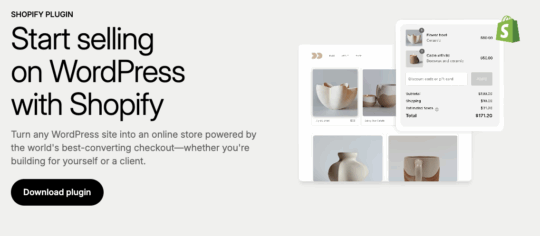
WordPress for eCommerce
As the most popular Content Management System (CMS) available, WordPressⓇ has made a name for itself as a content marketing platform. Unfortunately, this fact can deter business owners from taking full advantage of WordPress and the many features it has to offer.
In reality, WordPress is versatile enough to be used for just about any business setup, and it’s increasingly being used for eCommerce stores. You can create a fully-functional, all-in-one eCommerce shop with WordPress, along with a bit of help from the platform’s many plugins and themes.
WP Engine’s eCommerce platform takes WordPress eCommerce to the next level with tools and features built for WooCommerce stores built on WordPress. Increase website speed up to 40% and grow sales up to 18%. Site migration is free and backed by a 60 day money back guarantee!
In this post, we’ll discuss the use of WordPress as an eCommerce platform and highlight a few popular tools you can use for eCommerce success.We’ll also show you how to choose the right WordPress eCommerce tools for your business. Let’s get started!
Key Takeaways
- There is no one “right” way to build an eCommerce store using WordPress. In fact, there are many configurations that can lead to sales success on WordPress.
- WooCommerceⓇ is one of the most common eCommerce integrations for WordPress. Other integrations include Ecwid, BigCommerce, Shopify, and Adobe Commerce.
- There are many payment gateways you can choose for payment processing through your WordPress-powered eCommerce store. Popular options include Stripe PayPal, and Square.
- WP Engine’s eCommerce Performance Pack can improve store performance for eCommerce stores built with WooCommerce and hosted on our platform.
Why choose WordPress for eCommerce?
WordPress is an open-source Content Management System (CMS) with an array of uses and functionality. Its most popular use is as a blogging platform, but its customization and extendability make it an excellent option for nearly any type of website.
As an eCommerce platform, WordPress offers much in the way of integrations and customization options. There are a variety of themes and plugins you can use to add eCommerce features to your site, and the platform’s ease of use and scalability make it a viable option for businesses both large and small.
Who uses WordPress for eCommerce?
While WordPress can be expanded to fit almost any eCommerce needs, there are a few business cases for which it’s most suitable. These include stores that offer physical or digital products, services, or subscriptions.
However, businesses of all sizes can benefit from the numerous eCommerce features made available to WordPress users. To get access to this functionality, you’ll need to integrate WordPress with one or more external tools.
WordPress eCommerce integrations
One of the best things about WordPress is its ability to integrate with various eCommerce platforms and plugins that enable you to run a fully functioning store from your WordPress website, or even integrate certain eCommerce features (such as a shopping cart) into your current blog.
The variety of integrations available means you can choose the one that’s right for your business needs. The best option will vary based on your business size, product type, and overall goals, but there’s bound to be a choice that’s right for you. Let’s look at a few of the top tools now.
WordPress and WooCommerce

WooCommerce is the most popular WordPress eCommerce integration. It has an extensive list of add-ons and customization options and can be added to your WordPress website in minutes. Getting started is easy thanks to its simple setup wizard.
Ecwid and WordPress

Ecwid is another eCommerce option you can fully integrate with your current WordPress website. Using Ecwid, you can set up your store in minutes, and the Shopping Cart plugin makes getting started even easier.
WordPress and BigCommerce

BigCommerce is a unique eCommerce option, in that it enables you to handle various online shops via one comprehensive solution. Similar to Shopify, it has limited WordPress integration options at the moment. However, you can still easily run a WordPress blog alongside your BigCommerce store.
WordPress and Shopify

ShopifyⓇ is one of the most well-known eCommerce platforms on the market, and you can connect your Shopify store and your WordPress site with a simple plugin. This setup is ideal for businesses that already run a Shopify store but want to expand their content strategy through WordPress, allowing you to retain Shopify’s checkout, inventory management, and payment processing while using WordPress to publish optimized content.
WordPress and Adobe Commerce

Adobe Commerce, formerly Magento, is an eCommerce platform focused on its standalone offerings. However, a few third-party integration options do exist, which make it possible to add a WordPress blog to your Adobe eCommerce shop.
Comparing eCommerce solutions for WordPress
WordPress + WooCommerce vs. Shopify
When determining which eCommerce platform to use, you may find yourself choosing between two of the most popular options: WooCommerce and Shopify. While both platforms do offer similar features, there’s one major distinction between the two. Shopify is an external platform, while WooCommerce is built to integrate with WordPress fully.
When you choose to use WooCommerce and WordPress, you can handle all of your website’s needs in one place. If you opt for Shopify, on the other hand, you’ll be managing your store on one platform (Shopify) and your blog or website on another (WordPress). This makes WooCommerce a top choice for most users.
WordPress vs. Adobe Commerce
If WooCommerce and Shopify aren’t the platforms for you, however, Adobe Commerce is another option worth considering. As we mentioned earlier, this is an open-source software that’s similar to WordPress, but with one major difference. Adobe Commerce can support eCommerce shops by default, while WordPress websites require a bit of tweaking to get a store up and running.
Both WordPress and Adobe Commerce support blog posts and pages as well as eCommerce functionality – including shopping carts and customer accounts – although you’ll need the help of plugins to achieve this with WordPress. Ultimately, WordPress requires a little more work to get up and running, but it also offers much more in the way of customization.
WordPress eCommerce plugins & themes
WordPress eCommerce plugins
As we’ve mentioned, it’s entirely possible to use WordPress as your one-and-only eCommerce solution. This requires a bit of tweaking, which can be done with the help of dedicated plugins.

Some of the more popular eCommerce plugins include WooCommerce (which we’ve already discussed), Easy Digital Downloads, and WP EasyCart. Each can be used to add simple shopping carts and buy buttons, or to create a more robust eCommerce setup.
WordPress eCommerce Themes
To improve the look and functionality of your WordPress eCommerce shop, you can also use an eCommerce-specific theme. There are lots of options available, and they can range in cost from free to hundreds of dollars.

If you’re a WooCommerce user, we recommend building on a theme that integrates seamlessly with the platform. However, there are many eCommerce themes to choose from in the WordPress Theme Directory and on third-party sites.
WordPress payment forms
Stripe for WordPress
Stripe is an eCommerce payment solution that focuses on open-source tools and Application Program Interfaces (APIs). This means it can easily integrate with various platforms, including WordPress.

Setting up Stripe on WordPress is quite simple. Plus, there are a few plugins (such as Stripe for WooCommerce and WP Simple Pay) available to make the process even easier. For WP Engine customers, sites with eCommerce features enabled come equipped with a deep Stripe Connect integration pre-baked into your hosting plan, making payment processing simple and secure across your eCommerce offerings.
WooCommerce payment gateways
WooCommerce has multiple payment gateways available. Just a few of its options include PayPal, Stripe, and Square.

You can add as many payment options as you like, using both free and premium extensions. After downloading one of these extensions, it will be integrated into your WooCommerce store so you can begin accepting payments immediately.
Start selling more with WP Engine’s eCommerce features
If you’ve decided that WordPress is the right eCommerce solution for you, it’s now time to consider which host you should use. WP Engine is one of the most versatile hosting providers for WordPress users, with a variety of plans (and even enterprise options) to choose from.
As such, WP Engine’s eCommerce Performance Pack for WooCommerce stores can help you create a successful and fully functioning eCommerce store on your WordPress website.
